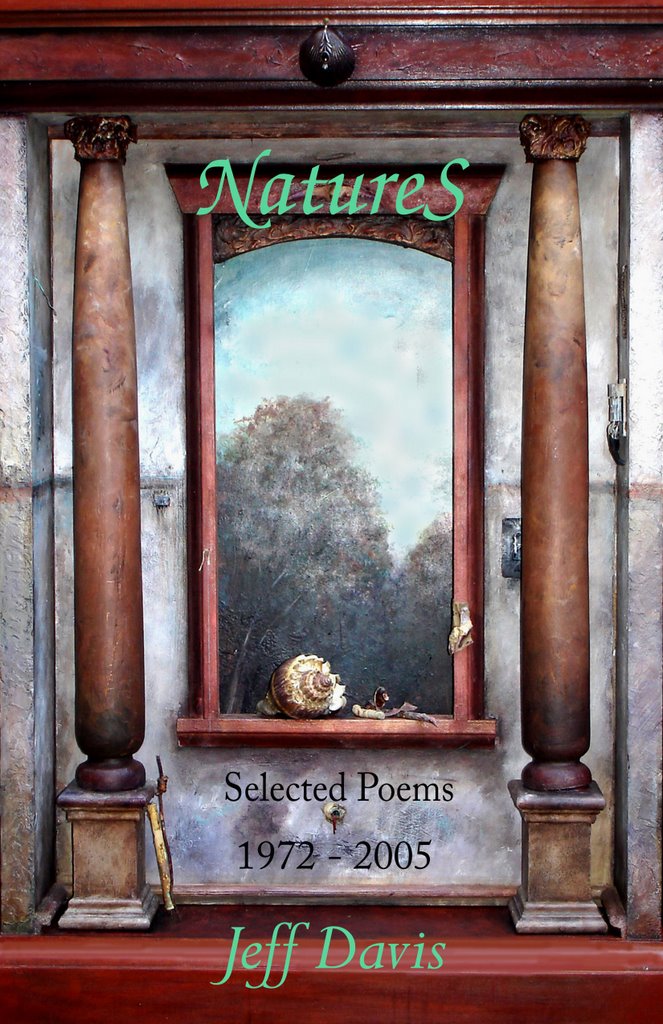NatureS: Further Studies

At one point while I was writing the short preface to NatureS I wanted to find the context of a quote from the German poet Novalis that has been a touchstone for me for the past thirty odd years: “I is the absolute communal place - the nexus.” I was surprised to discover that it had not found its way into my electronic notebooks (or should I say notefiles?) over the years I’ve been keeping them. I knew it was somewhere in one of the hardcopy, handwritten notebooks – probably in a couple of them – but I thought it’d be easier to confirm it by going back to what I remembered was its source, Karl Seigler’s translation of the “Encyclopedia IX”. It was published as the first issue of Tom Grieve’s Archai, from Vancouver, in 1973. I’ve looked for the text in other editions of Novalis’ writings (or translations of them, given my little German), but so far have managed to locate it nowhere else. In fact, other editions present a range of material from the fragments known as "Pollen" and the “Encyclopedia” that's so different I sometimes wonder if they’re actually based on the same text. To complicate cross-reference, no two editions I’ve seen in English use the same system for numbering and organizing the fragments; most often, it seems, the editors simply number selected fragments sequentially, as though they constituted a continuous excerpt. Some editions also replace Novalis’ punctuation with conventional contemporary punctuation, leaving a text that must be quite as far from Novalis’ original as early editions of Emily Dickinson’s poems were from her careful fascicles.
Here, in any case, is the full quote in context, from Seigler’s edition:
1688 In the point of freedom, in the “I”, we are all actually completely identical – only from this point does every identity divide. “I” is the absolute communal place – the nexus.
Another fragment brings further light to Novalis’ imagination of identity:
1694 Psychology and Encyclopedics. A thing becomes clear only through representation. One understands a matter most easily when one sees it represented. So one understands the “I” only insofar as it is represented by the “not I”. The “not I” is only a symbol of the “I”, and so serves only for the “I’s” understanding of itself. So, conversely, one understands the “not I” only insofar as it is represented by the “I” which becomes a symbol…
Some other fascinating notes on our relation to nature and on human time:
1741 We are simultaneously in and outside of nature.
1750 … Only the backward look takes us forward, since the forward look leads us back.
More fragments on cosmology:
1752 Cosmology. The outside is an inside elevated to a condition of mystery - (perhaps also vice versa.) …
1762 … Axiom: Of ourselves, we can know nothing. All true knowledge must be given us. …
And the last three powerful notes of Book IX:
1801 Psychology. Love is the ultimate purpose of the world’s history – the Amen of the universe.
1802 Theosophy. God is love. Love is the highest real – the original ground.
1803 Encyclopedics. The theory of love is the highest knowledge – the knowledge of nature – or the nature of knowledge. Philielogiae (or also philology).
It’s easy to understand, perhaps, reading these, why Novalis was among the subjects listed in Charles Olson’s “A Plan for a Curriculum of the Soul”, first published in The Magazine of Further Studies. Olson’s commission bore some considerable fruit over the years, as his friend and fellow poet Jack Clarke joined with Al Glover, another poet and student of Olson's, to found the Institute of Further Studies. They selected authors, including Robin Blaser, Robert Duncan, John Weiners, and more than a dozen others, including themselves, to complete the series. Or almost complete it; Ed Dorn and Robert Creeley never finished their contributions. After Clarke’s death, Glover continued the project by recruiting Lisa Jarnot and Michael Boughn, both of whom had been students of Creeley, to complete the final numbers, “(One’s Own) Language” and “Mind”, respectively. The series stands as a unique and remarkable undertaking.
The Robert Dalke’s “Novalis’ Subjects” fascicle, however, offers little in the way of the core of Novalis’ vision. It focuses primarily on the range of topics which Novalis proposed to address, and his attempts to articulate his vision for the “Encyclopedia.” Here, for example, are Dalke's translations of a few of Novalis’ Subjects:
Artistic LogicObviously, Novalis was more than able to think beyond the boundaries of the intellectual disciplines of his day; he’d still be stalking frontiers. There are now few moments in life when 70s hippie slang offers just the right language for an occasion, but this is one of them; he was truly “far out.” Dalke’s translation may be true to Olson’s specific charge (“cf. Novalis/’subjects’”), but doesn’t really get deeply into what made Novalis of interest to Olson, or might make him useful to anyone else. Seigler’s work seems long out-of-print, but we currently have available Margaret Mahony Stoljar’s 1997 translation of Novalis’ Philosophical Writings; it seems altogether useful, and appears to avoid the most objectionable forms of emendation. Reading through it, I find new fragments that might give me themes for reflection for the next few decades, and directions for even further – no, make that Further - Studies.
Philosophic Physiology
Scientific Divination
Pathologic Logic
Mystic Geometry
Physiologic and Psychologic Time Study
Witty Physics
Vegetable Magnetism
Musical Chemistry
Poetic Geography
Plant Politics
Mystic Grammar
Cosmogogics
********************************
May 5, 2006: Updated to include additional information on Al Glover's role in creating the Institute of Further Studies.
Labels: Buffalo, Further Studies, Jack Clarke, Novalis

0 Comments:
Post a Comment
<< Home